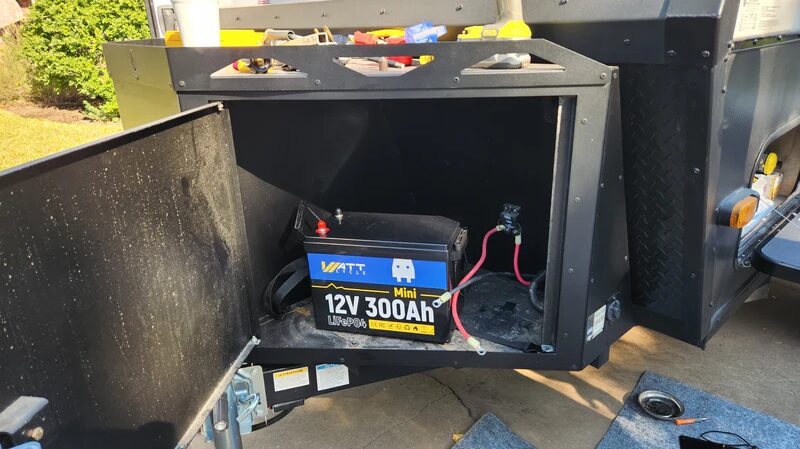Should You Use LiFePO4 Batteries in Your Car?

Your car’s starting battery is like the spark that lights the engine’s fire. Without it, you’re not going anywhere. Most people are familiar with traditional lead-acid batteries, but there’s a newer option that’s worth considering—LiFePO4 (Lithium Iron Phosphate) batteries. These batteries are known for their durability, efficiency, and versatility. While they’re more commonly used in things like solar setups or boats, they can also work as car starter batteries if you know what to look out for.
What Is a Car Starting Battery?
A car starting battery has one job: to give your engine the power it needs to start. These batteries, also called cranking batteries, provide a quick and powerful burst of energy to get your car running. Once the engine starts, the battery takes a backseat while the alternator handles everything else.
Starting batteries are different from deep-cycle batteries, which deliver steady power over a longer time. Some people opt for a dual-purpose battery that handles both jobs, but for most cars, a cranking battery is the standard choice. LiFePO4 batteries can also act as cranking batteries, but there are a few things you’ll need to consider before using them this way.
How LiFePO4 Batteries Work as Car Starting Batteries
LiFePO4 batteries are a great choice for lots of applications because they’re reliable, long-lasting, and efficient. They can also work as LiFePO4 car starter batteries, as long as they meet your car’s specific needs.
When starting an engine, your battery needs to deliver a lot of power fast. LiFePO4 batteries can handle this. But they’re not usually used as car starter batteries, Because the maximum discharge current of most LiFePO4 batteries will not support the start of your car. For example, a small number of LiFePO4 battery BMS support a maximum of 1000CCA for 8 seconds, which fully supports the car’s starting current and time, while some LiFePO4 batteries, the maximum discharging current of only 350A can only last for 3 seconds, which is obviously not enough to start the car, when the car has not started, the battery will be broken down by strong current. So you need to carefully check their parameters when buying, but even if you buy a LiFePO4 lithium battery with a large enough maximum discharge current and long enough sustained current, it is still not recommended to use it as a starter battery in your car. Because there’s a other good reason for that: heat. Car batteries are typically stored under the hood, where temperatures can get pretty high. This can affect the performance and lifespan of a LiFePO4 starter battery.
If you decide to use a LiFePO4 battery for your car, it’s important to take precautions, like keeping it out of the engine bay to avoid heat damage.
Key Things to Keep in Mind
Check the Maximum Current: Make sure the LiFePO4 battery can handle the high power demands of your car’s starter motor. If it doesn’t have enough current or power, it won’t work.
Look at the Current Duration: Starting a car isn’t just about the power; it’s also about how long the battery can sustain that power. Confirm that the LiFePO4 battery can handle the job.
Heat Matters: LiFePO4 batteries don’t love heat, so placing them under the hood isn’t ideal. If you’re set on using one, find a cooler spot to install it.
Think About Dual-Purpose Needs: If you want a battery that can start your car and also power other devices, a dual-purpose battery might be a better fit. LiFePO4 batteries are great for deep-cycle use but aren’t always the best for starting tasks.
By keeping these points in mind, you can decide whether a LiFePO4 car starter battery is right for you. They’re not the default choice for cars, but with the right setup, they can work just fine.
When and Where Can LiFePO4 Batteries Be Used for Starting Engines?
LiFePO4 batteries aren’t just limited to cars—they shine in other settings, especially where managing heat is easier. For instance, they’re a popular choice for marine cranking batteries. Boats typically have their batteries stored in cooler compartments, making it a better environment for LiFePO4 batteries to perform reliably.
Beyond marine use, these batteries are also great for RVs and backup power systems where high starting currents and deep-cycle functionality might both be needed. Their long lifespan and consistent power delivery make them a dependable choice for such applications.

If you’re thinking about using a LiFePO4 deep cycle battery for starting engines, it’s often more practical in environments that don’t subject the battery to extreme temperatures or high vibration.
Conclusion
LiFePO4 batteries offer a lot of benefits—they’re efficient, durable, and versatile. While they’re not typically the first pick for car starting batteries, they can work in the right circumstances. Just be sure to consider factors like temperature, location, and your car’s power needs before making the switch.
For other applications like boats, RVs, and backup systems, LiFePO4 batteries are a natural fit. Their reliability and long lifespan make them a solid investment for powering engines and devices in those settings.





